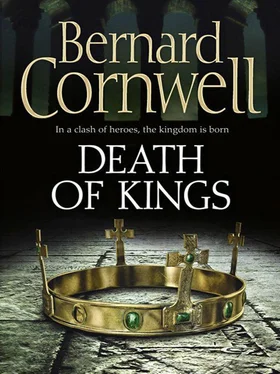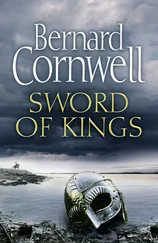Two of the other slave traders had followed us into the shed and they protested fiercely that we were liars and murderers. They pointed out that their trade was legal and that they had been promised the protection of the laws. They demanded that I stand trial for manslaughter and that I pay a huge price in silver for the lives I had taken. Weohstan listened to them patiently. ‘You’d swear an oath at his trial?’ he asked the two men.
‘We will!’ one of the traders said.
‘You’ll tell what happened and swear to it on oath?’
‘He must compensate us!’
‘Lord Uhtred,’ Weohstan turned to me, ‘you’ll bring oath-givers to contest the evidence?’
‘I will,’ I said, but the mention of my name had been enough to drain the belligerence from the two men. They stared at me for an eyeblink, then one of them muttered that Halfdan had always been an argumentative fool.
‘So you won’t swear in court?’ Weohstan asked, but the two men were already backing away. They fled.
Weohstan grinned. ‘What I’m supposed to do,’ he said, ‘is arrest you for manslaughter.’
‘I didn’t do anything,’ I said.
He looked at Serpent-Breath’s reddened blade. ‘I can see that, lord,’ he said.
I stooped to Halfdan’s body and slit his tunic open to find a mail coat, but also, as I expected, a pouch at his waist. It was the pouch that had stopped my first knife thrust and it was crammed with coins, many of them gold.
‘What do we do with the slaves?’ Weohstan wondered aloud.
‘They’re mine,’ I said, ‘I just bought them.’ I handed him the pouch after taking a few coins for myself. ‘That should buy oak trunks for a palisade.’
He counted the coins and looked delighted. ‘You’re an answer to prayer, lord,’ he said.
We took the slaves to a tavern in the new city, the Saxon settlement that lay to the west of Roman Lundene. The coins I had taken from Halfdan’s purse paid for food, ale and clothing. Finan talked to the men and reckoned a half-dozen would make good warriors. ‘If we ever need warriors again,’ he grumbled.
‘I hate peace,’ I said, and Finan laughed.
‘What do we do with the others?’ he asked.
‘Let the men go,’ I said, ‘they’re young, they’ll survive.’
Ludda and I spoke with the girls while Father Cuthbert just stared at them wide-eyed. He was entranced by the dark-skinned girl, whose name appeared to be Mehrasa. She looked the oldest of the six, she was perhaps sixteen or seventeen while the others were all three or four years younger. Once they realised they were safe, or at least not in any immediate danger, they began to smile. Two were Saxon girls, taken from the coast of Cent by Frankish raiders, and two were Franks. Then there was the mysterious Mehrasa, and the sick girl who was a Frisian. ‘The Centish girls can go home,’ I said, ‘but you take the others to Fagranforda.’ I was speaking to Ludda and Father Cuthbert. ‘Choose a pair of them. Teach them what they need to know. The other two can work in the dairy or kitchens.’
‘A pleasure, lord,’ Father Cuthbert said.
I looked at him. ‘If you mistreat them,’ I said, ‘I’ll hurt you.’
‘Yes, lord,’ he said humbly.
‘Now go.’
I sent Rypere and a dozen men to protect the girls on their journey, but Finan and I stayed in Lundene. I have always liked that city and there was nowhere better to discover what happened in the rest of Britain. I talked to traders and travellers and even listened to one of Erkenwald’s interminable sermons, not because I needed his advice, but to hear what the church was telling its people. The bishop preached well and his message was exactly what Archbishop Plegmund wanted. It was a plea for peace, to give the church time to enlighten the heathen. ‘We have been oppressed by war,’ Erkenwald said, ‘and we have been soaked by the tears of widows and of mothers. Every man who kills another man breaks a mother’s heart.’ He knew I was in the church and was staring into the shadows where I stood, then he pointed at a fresh painting on the wall that showed Mary, Christ’s mother, weeping at the foot of the cross. ‘What guilt those Romans had to bear, and what guilt we bear when we kill! We are the children of God, not lambs to be slaughtered.’
There had been a time when Erkenwald preached slaughter, urging us to ravage the pagan Danes, but the coming of the year 900 had somehow persuaded the church to enjoin peace on us, and it seemed their prayers were being answered. There were cattle raids on the borderlands, yet no Danish armies came to conquer. Later that summer Finan and I went aboard one of Weohstan’s ships and were rowed downriver to the wide estuary where I had spent so much time. We went close to Beamfleot and I saw that no Danes had tried to rebuild the burned forts and no ships lay in the Hothlege Creek, though we could see the blackened ribs of the vessels we had burned there. We went further east to where the Temes widened into the great sea and we nosed the boat across the shallows at Sceobyrig, another place where Danish crews liked to wait in ambush for trading ships travelling to and from Lundene, but the anchorage was empty. It was the same on the estuary’s southern bank. Nothing but wild birds and wet mud.
We rowed up the curving River Medwæg to the burh at Hrofeceastre where I saw that the timber palisade atop the mighty earth bank was rotting like the one in Lundene, but a great heap of newly felled oak trunks suggested that someone here was ready to repair the defences. Finan and I went ashore at the wharf by the Roman bridge and walked to the bishop’s house beside the great church. The steward bowed to us and, when he heard my name, did not dare ask for my sword. Instead he took us to a comfortable room and had servants bring us ale and food.
Bishop Swithwulf and his wife arrived an hour later. The bishop was a worried-looking man, grey-haired, with a long face and twitching hands, while his wife was small and nervous. She must have bowed to me ten times before sitting. ‘What brings you here, lord?’ Swithwulf asked.
‘Curiosity,’ I said.
‘Curiosity?’
‘I’m wondering why the Danes are so quiet,’ I said.
‘God’s will,’ the bishop’s wife said timidly.
‘Because they’re planning something,’ Swithwulf said. ‘Never trust a Dane when he’s silent.’ He looked at his wife. ‘Don’t the cooks need your advice?’
‘The cooks? Oh!’ She stood, fluttered for a moment, then fled.
‘Why are the Danes quiet?’ Swithwulf asked me.
‘Sigurd’s ill,’ I suggested, ‘Cnut’s busy on his northern border.’
‘And Æthelwold?’
‘Getting drunk in Eoferwic,’ I said.
‘Alfred should have strangled him,’ Swithwulf growled.
I was warming to the bishop. ‘You’re not preaching peace like the rest?’ I asked.
‘Oh, I preach what I’m told to preach,’ he said, ‘but I’m also deepening the ditch and rebuilding the wall.’
‘And Ealdorman Sigelf?’ I asked. Sigelf was the ealdorman of Cent, the county’s military leader and its most prominent noble.
The bishop looked at me suspiciously. ‘What of him?’
‘He wants to be King of Cent, I hear.’
Swithwulf was taken aback by that statement. He frowned. ‘His son had that idea,’ he said cautiously, ‘I’m not sure if Sigelf thinks the same way.’
‘And Sigebriht was talking to the Danes,’ I said. Sigebriht, who had surrendered to me outside Sceaftesburi, was Sigelf’s son.
‘You know that?’
‘I know that,’ I said. The bishop sat silent. ‘What’s going on in Cent?’ I asked, and still he was silent. ‘You’re the bishop,’ I said, ‘you hear things from your priests. So tell me.’
Читать дальше
Конец ознакомительного отрывка
Купить книгу












